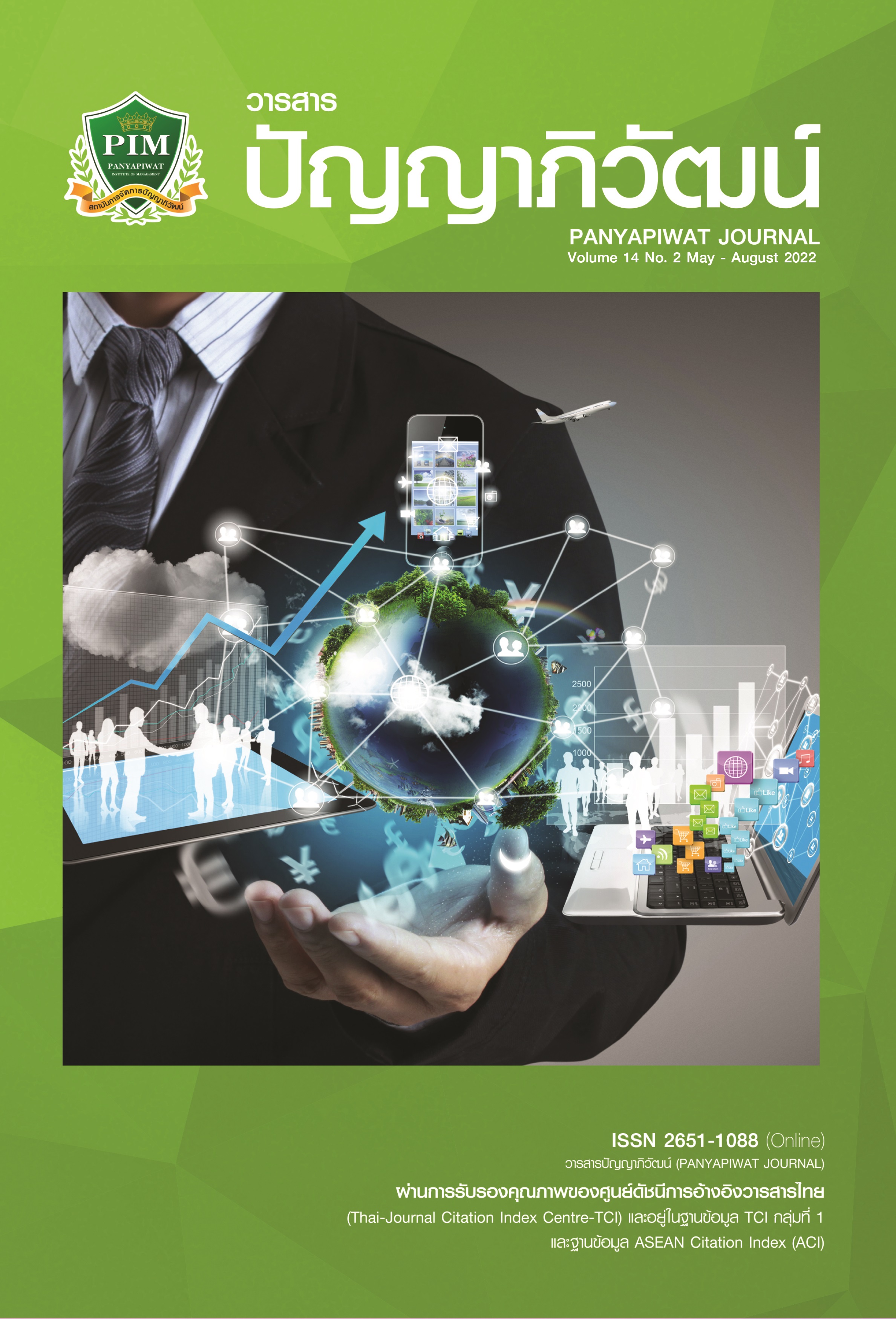FACTORS AND OBSTACLES OF PRIVATE AND PUBLIC SECTOR EMPLOYEES’ DECISION TO RESKILLING AND UP SKILLING ON DIGITAL SKILLS IN BANGKOK AND METROPOLITAN AREA
Main Article Content
บทคัดย่อ
This research studies the factors encouraging employees and obstacles to acquire digital skills in responding to digital transformation in public and private organizations in Bangkok and Metropolitan area. A survey questionnaire was distributed using non-probability and purposive sampling methods. About 425 valid data samples were collected back from June 2020 to March 2021. The binary logistics regression was employed to analyze the factors affecting the development of digital skills.
The findings show that megatrend, the rapid change of digital disruption, career advancement, job promotion, and job security are the factors significantly affect the digital skills development. The main obstacles are a lack of financial support and no clear supporting policy from the companies. Apart from common digital skills for routine work, they mainly focus on developing big data analysis, programming, web and app development, and automation skills. Most of the respondents develop their skills by self-study through online channel, on the job training, and attending training organized by private sector with financial support from their companies.
Article Details

อนุญาตภายใต้เงื่อนไข Creative Commons Attribution-NonCommercial-NoDerivatives 4.0 International License.
“ข้าพเจ้าและผู้เขียนร่วม (ถ้ามี) ขอรับรองว่า บทความที่เสนอมานี้ยังไม่เคยได้รับการตีพิมพ์และไม่ได้อยู่ระหว่างกระบวนการพิจารณาลงตีพิมพ์ในวารสารหรือแหล่งเผยแพร่อื่นใด ข้าพเจ้าและผู้เขียนร่วมยอมรับหลักเกณฑ์การพิจารณาต้นฉบับ ทั้งยินยอมให้กองบรรณาธิการมีสิทธิ์พิจารณาและตรวจแก้ต้นฉบับได้ตามที่เห็นสมควร พร้อมนี้ขอมอบลิขสิทธิ์บทความที่ได้รับการตีพิมพ์ให้แก่สถาบันการจัดการปัญญาภิวัฒน์หากมีการฟ้องร้องเรื่องการละเมิดลิขสิทธิ์เกี่ยวกับภาพ กราฟ ข้อความส่วนใดส่วนหนึ่งและ/หรือข้อคิดเห็นที่ปรากฏในบทความข้าพเจ้าและผู้เขียนร่วมยินยอมรับผิดชอบแต่เพียงฝ่ายเดียว”
เอกสารอ้างอิง
Bernard, H. R. (2017). Research methods in anthropology: Qualitative and quantitative approaches. Rowman & Littlefield.
Billett, S. (1995). Workplace learning: Its potential and limitations. Education and Training, 37(5), 20-27.
Hora, V., Chutijirawong, N., Ekviriyakit, M., & Bunyalug, C. (2021, June 1). Thailand digital transformation survey report 2021: The impact of COVID-19. Deloitte. https://www2.deloitte.com/th/en/pages/technology/articles/the-thailand-digital-transformation-survey-report-2020.html
Fenech, R., Baguant, P., & Ivanov, D. (2019). The changing role of human resource management in an era of digital transformation. Journal of Management Information and Decision Sciences, 22(2), 1-10.
Hair, J. F. Jr., William, C. B., Barry J. B., & Anderson, R. (2013). Multivariate data analysis (7th ed.). Pearson Prentice Hall.
Graetz, F., & Smith, A. C. (2010). Managing organizational change: A philosophies of change approach. Journal of Change Management, 10(2), 135-154.
Heckhausen, J., Wrosch, C., & Schulz, R. (2010). A motivational theory of life-span development. Psychological REVIEW, 117(1), 32-44.
Hooley, T. (2012). How the internet changed career: Framing the relationship between career development and online technologies. Journal of the National Institute for Career Education and Counselling, 29(1), 3-12.
Hwang, Y., Kettinger, W. J., & Yi, M. Y. (2015). Personal information management effectiveness of knowledge workers: Conceptual development and empirical validation. European Journal of Information Systems, 24(6), 588-606.
Kanfer, R., & Ackerman, P. L. (2004). Aging, adult development, and work motivation. Academy of Management Review, 29(3), 440-458.
Kanfer, R., Frese, M., & Johnson, R. E. (2017). Motivation related to work: A century of progress. Journal of Applied Psychology, 102(3), 338-355.
Kettunen, J., Sampson, J. P., Jr., & Vuorinen, R. (2015). Career practitioners’ conceptions of competency for social media in career services. British Journal of Guidance & Counselling, 43(1), 43-56.
Lent, R. W., Brown, S. D., & Hackett, G. (1994). Toward a unifying social cognitive theory of career and academic interest, choice, and performance. Journal of Vocational Behavior, 45(1), 79-122.
Lissitsa, S., Chachashvili-Bolotin, S., & Bokek-Cohen, Y. A. (2017). Digital skills and extrinsic rewards in late career. Technology in Society, 51, 46-55.
Mandl, I., & Curtarelli, M. (2017). Crowd employment and ICT-based mobile work-new employment forms in Europe. In Policy Implications of Virtual Work (pp. 51-79). Palgrave Macmillan.
Miles, R. E., & Snow, C. C. (1994), Fit, failure and the hall of fame. The Free Press.
Osei, H. V., Agyapong, A., & Kwateng, K. O. (2019). The moderated mediation processes in firm-specific human capital development and task performance relationship. International Journal of Organizational Analysis, 27(3), 396-413.
Palinkas, L. A., Horwitz, S. M., Green, C. A., Wisdom, J. P., Duan, N., & Hoagwood, K. (2015). Purposeful sampling for qualitative data collection and analysis in mixed method implementation research. Administration and Policy in Mental Health and Mental
Health Services Research, 42(5), 533-544.
Rudolph, C. W., Rauvola, R. S., Costanza, D. P., & Zacher, H. (2021). Generations and generational differences: Debunking myths in organizational science and practice and paving new paths forward. Journal of Business and Psychology, 36(6), 945-967.
Schwartz, G. J. (2019). An examination of key factors that influence employee learning in the workplace. In The Wiley Handbook of Global Workplace Learning (pp. 477-500). Wiley Blackwell Publishing.
Scott, S. G., & Bruce, R. A. (1994). Determinants of innovative behavior: A path model of individual innovation in the workplace. Academy of Management Journal, 37(3), 580-607.
Tongco, M. D. C. (2007). Purposive sampling as a tool for informant selection. Ethnobotany Research and Applications, 5, 147-158.
Van Laar, E., Van Deursen, A. J., Van Dijk, J. A., & De Haan, J. (2019). Determinants of 21st century digital skills: A large-scale survey among working professionals. Computers in Human Behavior, 100, 93-104.
Zimmerman, B. J. (2002). Becoming a self-regulated learner: An overview. Theory into Practice, 41(2), 64-70.


